1. Development of self-sufficient and responsible staff
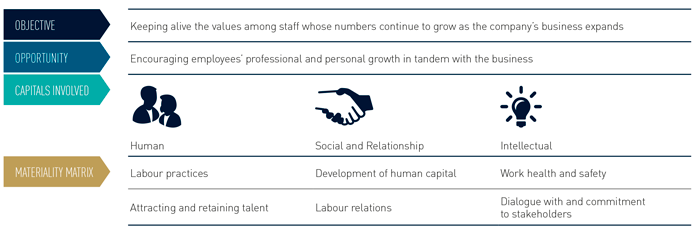
Growth
People are a key element for consolidating Inditex’s growth. In a complex, demanding and competitive environment, and as part of a modern, different and changing sector, our staff are one of the Group’s differentiating factors. Among the instruments used to involve employees, Inditex encourages leadership, providing them with a working environment that promotes autonomy and ability to assume responsibility. This enables staff and company to grow together. The challenge is to maintain these values among new employees, an staff whose multiculturalism never ceases to increase, with more than 130 nationalities and 45 working languages. The staff are also young, with an average age of 31.
Changes in Inditex Group employee numbers
| 2008 | 2009 | 2010 | 2011 | 2012 |
|---|---|---|---|---|
| 89,112 | 92,301 | 100,138 | 109,512 | 120,314 |
Employees by areas of activity 2012 |
Employees by geographic area 2012* |
|---|---|
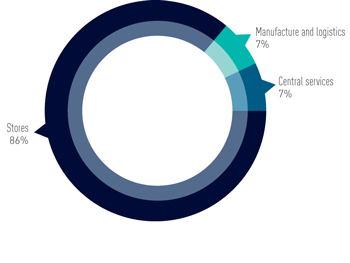
|
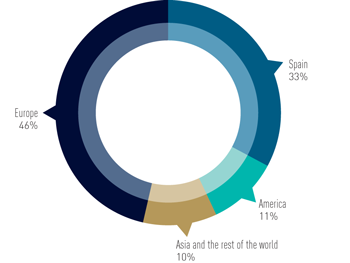
|
Newly-opened stores
Zara launches its new image in the store at 666 Fifth Avenue in New York. More than 390 people work there.
Inditex closed 2012 with a total of 120,314 employees, 10,802 were net starts during the year. This growth in staff was accompanied by the expansion of the Group, as occurred in new store openings, such as Zara and Massimo Dutti in New York’s Fifth Avenue, Pull&Bear in Austria, Bershka in Japan or Stradivarius in Mexico. Significantly do 86% of the staff work in the Group’s stores.
One of the characteristics of the year was the investment in expanding and renovating several of the Group’s logistic centres, all of them in Spain. At 2012 year-end, 7,149 people were working in these platforms, a key element in Inditex’s expansion. In addition, the development of on-line sales was a new step forward, with entry into new markets such as China.
In 2012, Inditex renewed its Code of Conduct and Responsible Practices, which all the Group’s employees are required to obey, replacing the previous Internal Code of Conduct and the Internal Responsible Practices Directory. This text establishes the principles and values that must guide the Inditex Group’s relations with its main interest groups, and which should inspire professional, ethical and responsible commitment.
Distribution by markets in the Inditex Group
| EUROPE | |
|---|---|
| Austria | 833 |
| Belgium | 1,740 |
| Bosnia-Herzegovina | 72 |
| Bulgaria | 403 |
| Croatia | 606 |
| Czech Republic | 331 |
| Denmark | 90 |
| Former Yugoslav Republic of Macedonia | 111 |
| France | 7,054 |
| Germany | 4,213 |
| Greece | 2,840 |
| Holland | 1,326 |
| Hungary | 609 |
| Ireland | 726 |
| Italy | 5,446 |
| Kazakhstan | 227 |
| Luxembourg | 111 |
| Monaco | 33 |
| Montenegro | 93 |
| Norway | 147 |
| Poland | 3,760 |
| Portugal | 5,562 |
| Romania | 1,566 |
| Russia | 7,705 |
| Serbia | 422 |
| Slovakia | 192 |
| Spain | 39,468 |
| Sweden | 469 |
| Switzerland | 770 |
| Turkey | 2,972 |
| UK | 4,474 |
| Ukraine | 928 |
| Total Europe | 95,299 |
| AMERICA | |
|---|---|
| Argentina | 774 |
| Brazil | 2,398 |
| Canada | 1,121 |
| Chile | 774 |
| Mexico | 4,398 |
| Uruguay | 191 |
| USA | 3,115 |
| Total America | 12,771 |
| ASIA AND THE REST OF THE WORLD | |
|---|---|
| Australia | 498 |
| Bangladesh | 37 |
| China | 5,552 |
| Hong Kong | 1,078 |
| India | 415 |
| Japan | 2,865 |
| Macao | 157 |
| South Africa | 233 |
| South Korea | 969 |
| Taiwan | 440 |
| Total Asia and the rest of the world | 12,244 |
| GENERAL total | 120,314 |
Retaining talent
Eighty-six percent of Inditex Group’s employees work in our stores, and represent the heart of Inditex’s business model. This is the reason why the Human Resources Department makes such an effort to invest in detecting and developing talent among professionals already working in the Group.
In this context, one of the main tools is the Intalent programme. Initiated in 2010, it is an opportunity for all store employees to provide their CV information and describe where they would like to go in the Group. Some 50,000 employees have already taken part in this programme, now already implemented in 12 European countries. There are also plans for identifying potential adapted to the reality of each country, with the aim of ensuring talent is not wasted. In Europe alone, these programmes include nearly 2,000 people.
Examples of these programmes are Career Designer in Poland or Store Manager Development Programmes in Turkey; in both cases, workshops and meetings with trainers have been used to develop the participants’ skills in order to fill store supervisor positions internally.
Internal promotion is also the basis for Inditex team development. There are specific programmes focussing on the most strategic profiles, such as the Managerial Development Programme, aimed at training personnel with an international outlook for management posts.
Training*
All these potential identification projects have been reinforced by training plans that either ensure the future success of Inditex professionals or the continued empowerment of the Group’s greatest capital. In order to improve their technical or personal abilities,a total of 13,374 people have received training. Regarding the stores, 7,044 people have been trained, including the pioneering project launched in 2012, e-fashion, an on-line, distance learning initiative to train store teams in issues related to managing a fashion business, held in conjunction with the Istituto Europeo di Design (IED), one of the most prestigious fashion schools in the world. The pilot edition saw 90 people participate, from all the Group’s chains. In the 220 course hours, attendees were given an in-depth look at topics such as trends, e-commerce and store management.
The training plans organised for the logistics platforms in Spain were another key feature last year, with 3,511 people having attended. Of particular note in 2012 were the efforts made in work safety. Among the topics discussed on this training course, special emphasis was placed on issues relating to adopting correct postures during work to reduce the incidence musculoskeletal injuries and handling machinery or carrying out work at heights. Courses on equality were also held. In addition, employees at the logistic platforms and at the factories have been trained to promote a better performance at their work. For instance, the development of communication abilities among the middle management at Zaragoza’s logistic platform. A total of 3,915 people have attended.
* Information corresponding to the period between January 1st and December 31st 2012, except for the e-fashion programme, which started in 2012 and ends in 2013.Attracting talent
The Inditex Group’s strategy to attract the best professionals is based on two tools: the Joinfashion! platform (coordinated through the www.joinfashion.com website) and the recruitment centres.
In the former case, after its successful launch in 2011, Joinfashion! has continued to develop as a channel to centralise the employment opportunities in the Inditex Group. Thus it maintains its identifying characteristics, such as videos to go with some of the job offers and, through the testimonies of professionals working in the Group, it transmits the Inditex philosophy, values and business model.
The recruitment and training centres are another of Inditex’s investments to guarantee the best professionals are recruited for the Group’s stores, thus ensuring the best service for our customers. During 2012, the Madrid and Barcelona centres received more than 80,000 candidates interested in working for Inditex. In Europe, the London recruitment and training centre (the first to be opened outside Spain, in 2011), has covered most of the vacancies for the Group’s stores in the UK capital. Furthermore, 2012 saw the addition of Milan and Paris, with more than 13,000 candidates attending, and Moscow, where recruitment is centralised for the whole country, one of Inditex’s main markets in the continent. These centres do not only carry out the recruitment process, they also undertake training projects, such as the Inditex School, a training programme for new recruits to the store. During 2012, a total of 95 candidates took part in this programme, 90% of whom were recruited.
To attract the best, the Group has developed a direct attraction strategy at the source centres for inspiration. Thus, Inditex works with the main fashion schools and the most important fashion shows. Last year, it paid 20 visits to fashion and design schools in Europe and the USA, as well as the main European fashion weeks.
The Cantera Project continues its consolidation as one of the foundations for incorporating young talent, training it from the bottom up to grow with the company. During 2012, 44 people joined the project to become future designers, buyers and product managers. This attraction strategy, following the traditional model, is complemented by presence in the social networks, as Inditex realises most of our potential professionals move in these fields. This year saw the launch of JoinFashion! in the 2.0 web world. The Inditex recruitment platform now has its own page on both Facebook and LinkedIn, and has started to operate on Twitter, producing greater visibility for job offers. This has produced 50% of new recruits through the work carried out on these networks, either by direct attraction or candidates learning about Inditex through them. It is one of the strategies Inditex will be strengthening in 2013.
Commitment
Inditex’s commitment to its employees is expressed through various objectives, such as promoting work/personal life reconciliation and establishing fair remuneration systems, good working relations and a permanent dialogue with social institutions and representatives.
Reconciliation
Inditex, whose staff is 78.7% women, has a specific commitment to equal opportunities for men and women and to non-discrimination. This commitment to equality started in 2006 with the ratification of the Equal Active Diversity Project, co-financed by the European Commission and managed by the Spanish Coordinator from the Women's European Lobby and the Carolina Foundation.
The aim of this project is to promote measures to guarantee equality of treatment and opportunity of women and men in all areas of the company, applying the gender perspective to all its policies and decisions, guaranteeing non-discrimination in salaries due to sex and progressing towards co-responsibility.
Employees by gender |
|
|---|---|
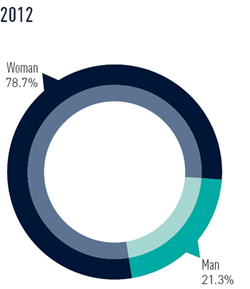
|
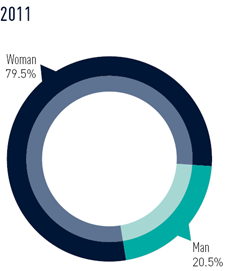
|
Once the Equality Bill was approved and published in Spain in 2007, Inditex began a comprehensive gender-based analysis process diagnosing the situation of company employees in terms of access, contracting, recruitment, work health, training, promotion, balance in work, family and personal life, sexual or gender-based harassment and communication and gender violence, to establish the real data on possible inequalities and initiate negotiations on corrective and positive action measures, providing form and content to the different equality plans negotiated so far for each of the Group’s companies.
As of 2011, equality plans have been negotiated, agreed on and fully implemented in the following logistics centres: Europa Platform, Meco Logistics Platform, Massimo Dutti Logistics, Bershka Logistics, Pull&Bear Logistics, Zara Home Logistics, Zara Logistics, Stradivarius Logistics, Tempe and Factories.
In 2012, Inditex made significant progress in the negotiations for the state equality plans in the following Group chains: Massimo Dutti S.A., Pull&Bear España S.A. and Zara España S.A.
Through previously negotiated plans implemented in its companies, the Inditex Group has assumed the commitment to make these documents an effective instrument for improving the working atmosphere, optimising the skills and potential of all employees and, thus, improve their quality of life and increasing productivity, rather than just a document produced through legal obligation.
Positive measures for family and work balance have been established, going so far as to set precedents in some areas, making flexible working hours one of the main characteristics of the Inditex business model and improving licences (extended to civil partnerships and cases of dependent family members).
Periods of leave were considerably improved, some involving protecting a work position for studies or voluntary work. In addition, work is constantly being done to improve worker protection measures during pregnancy and breast-feeding, as well as work safety during gestation.
Of particular note regarding situations of gender violence is the possibility for immediate change of work centre, while reserving the work position for long periods of time.
In the monitoring and implementation of equality plans in 2012, six employees started the process of gaining accreditation as equality agents. These are in addition to the nine employees from different chains who were accredited in 2011 to oversee the proper execution of commitments in this area.
In 2012, Inditex extended a subsidy to all employees in Spain with family problems, which was already available at the logistics platforms. This involves giving financial assistance to those employees who have a disabled family member under their charge, with the aim of contributing to better balance between work and personal life in our teams.
Employees by sex in each commercial format (2012)
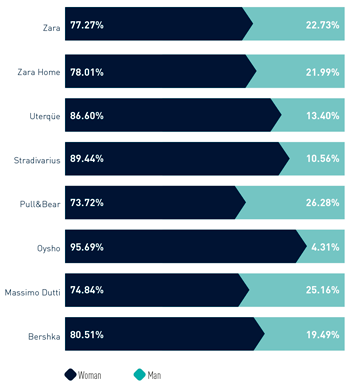
| Staff distribution in Spain by working day (2012)* | Staff distribution in Spain by contract type (2012)* |
|---|---|
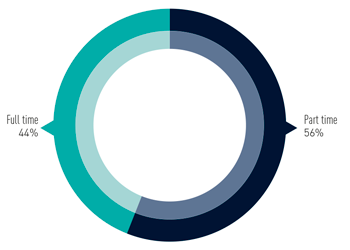
|
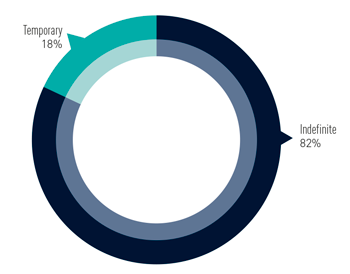
|
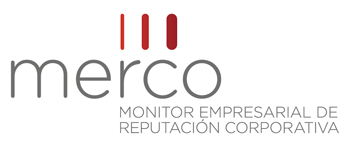
Merco Personas 2012
In 2012, Inditex reached first place on the list of the 100 best companies to work for, as drawn up each year by the the Corporate Reputation Business Monitor (MERCO). Merco Personas assesses variables such as professional development, motivation, working environment, pride in belonging, promotion of creativity and salary, among others variables. The survey includes more than 12,000 people, who highlighted the potential of the Inditex Group as an employer as well as how employees identify with company objectives.
Compensation policy
Each business area and country has compensation elements that are common to all and others adapted to each market and working environment.
Stores, logistics platforms and central services have variable compensation systems, linked to different measurements and objectives, which can be adapted to each group and professional in each market, thus successfully linking employees with the business objectives and results.
Staffing costs 2012
| (in thousands of euros) | 2012 | 2011 | Var. % |
|---|---|---|---|
| Fixed and variable salaries | 2,098,490 | 1,843,020 | 13.9% |
| Inditex contribution to Social Security | 449,220 | 391,158 | 14.8% |
| Total personnel expenses | 2,547,710 | 2,234,178 | 14.0% |
Work safety
In 2012, Inditex continued to develop its commitment to its employees health and safety. Especially significant were the actions taken in factories and logistics centres, helping to advance the implementation of OSHAS 18.001 certification as part of a Work Health and Safety Management System demanding the highest standards. In this context, the following actions performed in 2012 are worth highlighting:
- OSHAS 18.001 certification in: Tempe S.A and Bershka Logística S.A.
- OSHAS 18.001 implementation in the following companies: Pull & Bear Logística S.A, Plataforma Logística León S.A., Choolet S.A., Confecciones Fios, S.A., Confecciones Goa, S.A., Denllo S.A., Glencare S.A., Hampton S.A., Indipunt S.L, Indipunt Diseño S.L., Samlor S.A., Stear S.A., Trisko S.A., Zintura S.A, Plataforma Logística Meco S.A., Zara Logística S.A.
Volunteer work
Inditex encourages its employees to actively participate in society, as an essential part of the Group’s work in the field of corporate social responsibility (CSR).
INPULSE
In 2011, the Inpulse portal was set up as a corporate web platform for Inditex workers, with information on the Group’s CSR initiatives and the different types of actions in which they can become directly involved or participate.
The most ambitious project is undoubtedly The Big Idea Project, a social or environmental project competition, providing an opportunity for employees who, through a non-profit organisation, want to present a project with the possibility of funding and time off for the necessary voluntary work.
After the first edition in Spain in 2011, the second in 2012 was extended abroad to Poland, Germany, England and the USA. This latest edition had a higher number of projects, 172, of which 20 were chosen.
The Big Idea Project has thus gone international with total donations of €468,037 and 2,124 hours’ voluntary work, which will help make the 20 charity ideas a reality.
Integration
Inditex understands job creation as an exercise in responsibility. Thus, the Group undertakes different initiatives with the aim of facilitating integration into the labour market for groups with special needs or in situations of vulnerability.
In compliance with the Law of Social Integration of the Disabled (LISMI), applicable in Spain, in 2012, Inditex directly contracted a total of 762 people with a degree of disability equal to or greater than 33%, both in the different chains and the logistics platforms. In addition, after authorisation from the Ministry of Employment and Social Security, Inditex contracted the services of special employment agencies, equivalent in total to 105 more disabled workers. Also, the Group’s different chains have made donations to different associations and foundations, with the aim of integrating disabled people into the labour market, for more than €94,000, equivalent to contracting nine such workers.
Stylepack Programme
The Inditex logistics centre in Zaragoza has been home to a special employment centre (Stylepack) since 2010, providing jobs for 30 people with physical or intellectual disabilities. The workers, who are constantly supervised by two monitors, work primarily on re-labelling garments for countries such as India, Indonesia and Ecuador. The help and willingness of all employees at the centre is making it possible to completely integrate these people into the daily work routine.
Integration projects are also underway at the stores. Currently in A Coruña, Bilbao and Madrid, there are people with Down's syndrome working in some Group stores as part of a project to both provide them with jobs and offer personal achievement. The people involved in this project have a tutor who analyses their development and integration with the rest of the staff.
Jeunes Project
During 2012, Zara France continued its Jeunes Project solidarity programme in conjunction with Force Ouvrière labour union and completed its 11th cycle. The aim of this programme is to facilitate the integration of disadvantaged youths in the Paris metropolitan area into the labour market. In this case, there were two calls for entries, in which a total of 30 young people were employed by Inditex.
For&from programme
This programme, involving integration of people with disabilities into the work force, was launched in 2002 as a result of Inditex's commitment to providing innovative and sustainable solutions related to its business model that generate a financial and social impact. Thus Inditex, in conjunction with various social economy organisations working on the integration of people with disabilities into the labour market, has set up a programme currently involving six commercial establishments: one Massimo Dutti and one Bershka store in Palafolls (Barcelona); one Massimo Dutti and one Tempe store (accessories and shoes from all Inditex Group chains) in Allariz (Ourense); another Tempe store in Elche (Alicante) and a new Stradivarius store opened in 2012 in Manresa.
The for&from stores are managed by people with some type of physical or intellectual disability, belonging to the staff of the such social organisations. The stores are also completely fitted out to guarantee accessibility to any person with a physical disability.
Currently, the programme provides stable employment for 48 people with some type of disability. Our experience with this project has served as a bridge for integrating programme beneficiaries into the Group’s ordinary stores, based on their previous experience in for&from establishments.
More information on the for&from project in the Sustainability Balance Sheet
The Salta Project
2012 saw the 15th edition of the Salta project, which aims to help the integration of young people at risk of social exclusion in Madrid and Barcelona into the labour market. In conjunction with six foundations (Adsis, Atenea, Integra, Surt, Randstand and Casals dels Infants), last year 57 people were included in the project, making it now 300 young people who have joined the Group’s stores so far. The project offers strong theoretical training ranging from the more practical aspects of sales work and customer care to workshops on social skills. Training is completed with work placement in a store. Finally, all those who pass the training join as new sales staff in the stores of the Group’s different chains. This year, 85% of participants were contracted.


